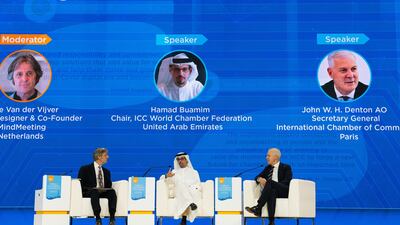Thousands of participants gathered at a global business conference in Dubai last month, to discuss ways for commerce to thrive amid the challenges posed by the coronavirus pandemic.
More than 3,800 people attended the 12th World Chambers Congress (12WCC) in the emirate.
The conference, which lasted for three days, was inaugurated by Sheikh Ahmed bin Mohammed, chairman of the Dubai Media Council.
It was a hybrid event, with 800 people attending in person and more than 3,000 taking part online.
The use of both virtual and real-world spaces, suitable for the post-Covid-19 era, made the conference the first of its kind.
"This year, we decided to organise the event while blending virtual and in-person platforms to prove that geographic boundaries are no longer an obstacle that can hinder dialogue or impede the exchange of ideas and expertise," said Hamad Buamim, president and chief executive of Dubai Chamber and chairman of the International Chamber of Commerce's World Chambers Federation.
Minister of State for Artificial Intelligence, Digital Economy and Remote Work Applications
One of the event’s key themes was how businesses can use digital technology to solve problems caused by the global pandemic.
Held every two years, the conference is an opportunity for heads of chambers of commerce from around the world to meet and discuss ways in which they can best support their members.
“The 12th edition of the event provides an opportunity to engage in a global dialogue on the increasingly important role that chambers of commerce play at a time when change is the only constant,” said Omar Al Olama, Minister of State for Artificial Intelligence, Digital Economy and Remote Work Applications. “This year’s theme – ‘Generation Next: Chambers 4.0’ – reflects the need to take a deeper look at how we can benefit from digital solutions in the post-pandemic era.”
Mr Al Olama, who is also chairman of the Dubai Chamber of Digital Economy, added that chambers of commerce around the world are in a “uniquely advantageous” position to take the lead as the world navigates “the new normal”.
More than 60 per cent of global supply chain executives said they expect digital transformation to accelerate due to the pandemic, according to a report released by Dubai Chamber, the event’s co-organiser.
Vulnerabilities in supply chains were exposed during the pandemic.
Digitalisation, automation and data intelligence chains will prove vital if businesses are to modernise and boost the efficiency of their supply chains, said the report titled 'Generation Next: Chambers 4.0 - Transforming Disruption into Opportunity for Global Business'.
It also highlighted that environmental, social and governance principals would be key drivers for business in the coming months.
Businesses should also focus on the challenge of achieving net-zero carbon emissions, said the report.
The conference involved more than 80 speakers, who took part in 44 interactive sessions.
Speakers included Maria Fernanda Garza Merodio, first vice-chair of the International Chamber of Commerce (ICC).
“As leaders, we must be prepared to innovate in the face of new and existing challenges and take bold action together,” she said.
The ICC has been working “hand-in-glove” with chambers to make the business case for equitable vaccine distribution, she added. It has also called upon governments and financial institutions to expand stimulus to small businesses that make up the real economy.

The 12WCC was co-organised by the Dubai Chamber, the ICC and its World Chambers Federation.
As a forum that brings business figures and heads of chambers together, one of its main aims is to raise awareness of ICC tools for trade.
It is also an opportunity for experts to share their latest findings, on pressing issues affecting the business world, with delegates.
The congress also helps chambers to become more involved in the ICC's work programme.
Overall, the event aims to show how working together can help members to make the most of opportunities and gain support to overcome challenges.
To help chambers of commerce around the world to better serve their members, Dubai Chamber launched “the Chambers Model Innovation (CMI) framework”.
The framework provides a reliable reference for chambers of commerce to deal with disruption and become more agile and proactive in meeting the needs of their members.
It has already been tested in several chambers of commerce around the world.
"The emirate of Dubai is once again leading the world into the future," said Mr Buamim. "Dubai Chamber has launched the Chamber Model Innovation framework to empower and mobilise the global chambers community to adopt a smarter approach to providing better services that deliver added value to their members."
Another innovation that was launched at the event was the Digital Fitness Test.
The tool, developed by PricewaterhouseCoopers in collaboration with Dubai Chamber, assesses each chamber’s digital capabilities and readiness. It also tests different chambers' ability to use technology to meet changing business needs.
The tool was launched in front of leaders of chambers from more than 100 countries.
The latest edition of the Dubai Innovation Index Report was also released at the conference.
The index assessed 39 cities last year, against categories such as agile government, infrastructure, funding, business environment and society.
Dubai ranked ahead of Beijing, Shanghai and Sao Paulo. This was because it scored highly for infrastructure, government and society.
Singapore was in first place, followed by Hong Kong, which occupied the second spot.
Dubai ranked 20th, meaning it led the Arab world in the index rankings.
The next World Chambers Congress will be held in Geneva, Switzerland, in 2023.

